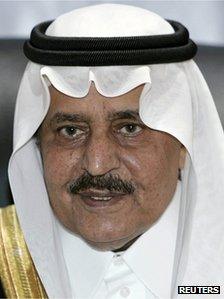Saudi Arabia: What crown prince's death means
- Published

Prince Nayef may be more pragmatic than his image suggests
The death of Crown Prince Sultan bin Abdulaziz al Saud makes it highly likely that the next heir apparent in Saudi Arabia will be his full brother, the Interior Minister, Prince Nayef.
Aged around 77, Prince Nayef is not in the best of health himself and delegates much of the day-to-day running of his ministry to two of his sons.
However, on the assumption that King Abdullah, who is about 88, will not be on the throne for that much longer, Prince Nayef is likely to be able to take up the responsibilities of monarch, even if he is also likely to typify the lack of dynamism that has been the hallmark of Saudi rule for the last two decades.
Prince Nayef is seen warily by those in the kingdom's non-royal elite who are inclined toward reform.
However, he has been adept at utilising conservative, including clerical, alliances to bolster his position.
Furthermore he lacks Prince Sultan's avariciousness, and as king is likely to prove more pragmatic than his image suggests.
While the issue of the "generational switch" will be enlivened by Prince Sultan's demise, it is unlikely to be conclusively dealt with.
As king, Nayef would probably be shadowed by his slightly younger full brother, Prince Salman, the long time governor of Riyadh.
Prince Salman, a strong contender to take over the defence ministry that Prince Sultan ran for nearly 50 years, is unlikely to forgo his claim to the throne.
Rubber stamp
King Abdullah created an allegiance council (hiya Al-Baya) to supposedly deal with succession issues in a consensual manner among the main claimants.
However, in practice this body is likely to merely rubber stamp such moves, and not take the lead in thrashing out a notional "deal" on who comes next after Prince Salman.
Behind the scenes, this decision is likely to be, as is traditionally the case, in the gift of the ruler - in this case Nayef.
The latter is more or less a shoo-in for the top job because of his appointment by King Abdullah in 2009 as second deputy premier.
While not inevitable, the occupant of this position, mortality allowing, is the de facto next in line after the crown prince.
In practice it will fall to Prince Nayef to take the lead on determining who this is to be when he becomes king, just as he will chose his heir apparent.
After Prince Salman, plausible candidates for king from the current generation of Saudi princes are thin on the ground - those favoured by King Abdullah are unlikely to have great prominence after his demise.
The internationally renowned sons of King Faisal are technically from the next generation, but the most plausible, Khalid, governor of Mecca, is over 70, and in any case the "Al-Faisal" are not favoured by Nayef.
With the generational switch likely to be in Nayef's hands to facilitate, my money would go on one of his two sons who hold the fort at the interior ministry to be the beneficiaries.
The most plausible is Mohammed bin Nayef, comparatively youthful at present and the de facto security boss.
However, his senior in age is his full brother Saud, who recently was brought back from a virtual diplomatic exile as ambassador to Spain to handle public affairs at the ministry.
These are the men to watch.
Neil Partrick is a contributor to the Gulf Programme at the London School of Economics and associate fellow at the Royal United Services Institute for Defence and Security Studies (RUSI) in London.
- Published4 October 2011
- Published12 November 2014